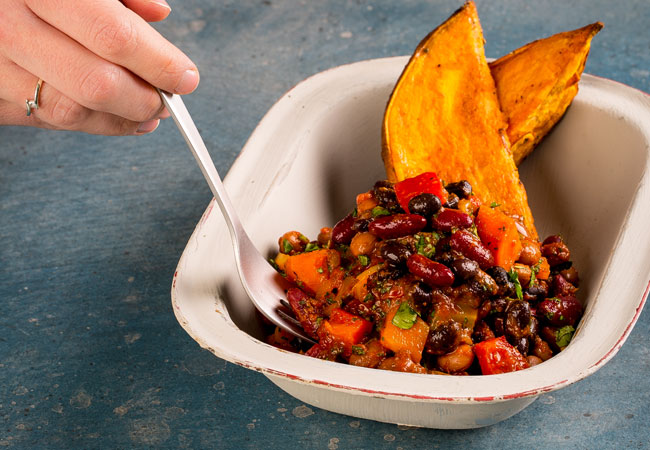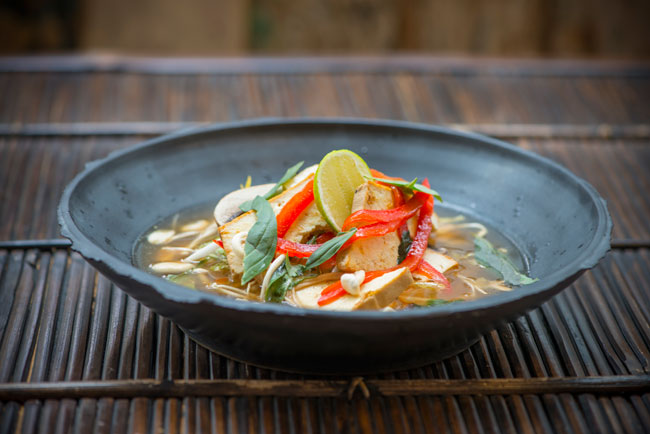Veganism: the power of plants
There are more than half a million vegans in Britain - a number that has increased by 360% in the last decade. And last year supermarket vegan food sales were up 1,500% from the previous year. With numbers like this, operators could be losing out on valuable custom by not catering for the vegan contingent.
Evidence of the environmental impact of meat farming is mounting, with farm animals a significant driver of greenhouse gas emissions and a drain on water supplies, leading to more people than ever deciding to cut out animal products from their diet. And vegan options can cover many bases for caterers: those with dairy and egg allergies or intolerances, vegetarians, pescatarians, those with health, religious or cultural concerns regarding meat, as well as the trend for 'clean eating'.
"A lot of people who go out with vegans will want to make sure that their vegan family member or friend is well catered for," says Heather Russell, dietitian at the Vegan Society.
"They'll probably check out the menu and if it looks like it's going to be a disappointment then they might take their custom elsewhere, so it really makes sense for establishments to be embracing vegan options and making sure they're prominent on their menu."
You're not pushing meat eaters away by including vegan options on your menu, says Sean O'Callaghan, who has run food blog Fat Gay Vegan for the past six years. "You're adding value to your business; you're adding reasons for them to come," he adds.
Money to be made
Lexington Catering launched Grains & Greens last year, a range of vegetarian and vegan options. Sales of vegetarian dishes have increased by approximately 20% since. "The price of meat is going right up, but you can start charging more for meat-free dishes when people start realising it's a really good plate of food," says Lexington development chef Jon Lilley. And not only have sales been driven by health-conscious consumers, but demand for a health and wellbeing aspect of the group's tender documents has also been huge from clients.
perfectly," he says.
To substitute or not?
The camps are divided on the topic of meat substitutes. An 'impossible burger' made from wheat, coconut oil and potatoes, touted to taste exactly like a beef burger by start-up Impossible Foods in California, has been backed by Bill Gates and adopted by Brad Farmerie's Michelin-starred Public restaurant in New York.
Yossi Edri, head of food at the Gate, a group of three London vegetarian restaurants, says, "We are more into showcasing the vegetable, plant or fruit. Instead of educating people to replace meat with something that looks like meat, we're trying to educate our customers that you don't need it at all - you can make great dishes based on plants only."
Edri says he is seeing an increase in demand for the restaurants' vegan dishes, which include cauliflower with smoked paprika tahini and pomegranate; miso-glazed aubergine; and tortillas with black beans, sweet potato and sweetcorn. And it isn't just attracting vegetarians and vegans - approximately 40% of customers at the restaurants are meat eaters these days.
Beyond salad
But to attract both groups, operators need to understand that vegan options don't start and end with a salad. "It's about making sure your vegan customers are getting the same dining experience. I'd like to see more restaurants offering the
full three courses, offering some choice, the same standard of dishes that other people are enjoying," says Russell.
"A lot of vegans want to eat a nice hearty, hot meal. That's an area where caterers and chefs could be improving. And also desserts. Vegan desserts are sometimes
missing from menus, or a disappointment - for example, a tart might be served without any of the usual creamy accompaniments."
Marcus Wareing's Tredwells offers a significant range of vegan dishes on the menu, including desserts such as marinated pineapple, passion fruit, coconut and vegan meringue made from aquafaba (chickpea water); and warm chocolate pudding with non-dairy banana ice-cream.

f-patron Chantelle Nicholson says this was always the intention from the outset. "It is important that all guests can enjoy the dining experience with us," she explains. Caterers can fall down on confusing veganism with healthy eating. "Veganism doesn't really have anything to do with organic produce or 'clean eating' or raw food," says O'Callaghan. "They overlap, of course, but they're separate issues. Vegans are just like anyone else - we want to have fun."
Alec Snelling owns vegan/vegetarian outlets the Waiting Room and the Full Nelson in Deptford, which opened late last year. The restaurants specialise in 'junk vegan' - 'fried chicken' and burgers made from seitan (wheat gluten). Business has been "crazy", he says.
"We never thought we would be so popular so quickly. We had our first brunch recently and it was pandemonium; we sold out our 'chicken' and waffles in less than 30 minutes."
There's no doubt for Gabriella Roberts, head of nutrition at contract caterer BaxterStorey, of the increasing popularity of veganism. "We need to show that we are doing it as well, otherwise our consumers will eat elsewhere," she says.

terStorey is working with Protein Challenge 2040 - a coalition exploring how to provide protein to the world's population in an affordable, healthy and environmentally friendly way - to increase its vegan and vegetarian-friendly options. The company recently ran its first plant-based culinary workshop with its Chef Academy, and plans to do more.
Getting creative in the kitchen Experimenting with plant-based ingredients to create vegan dishes has never been easier with the proliferation of vegan-friendly products around. Cashew cheeses and rice mozzarella, and soy and nut milks and creams are now widely available.
And for operators seeking vegan suppliers or for a little more inspiration, consumer vegetarian showcase VegfestUK is launching its first trade show at London's Olympia centre this October with approximately 160 stallholders, says organiser and presenter Karin Ridgers.
"[Operators] can come along and learn more about the products that are out there," she says. "They will be able to have one-on-one conversations with experts, with stallholders, and build up those relationships."
But ultimately, training and marketing are key to the success of vegan dishes, stresses Kirby - everyone in your business needs to understand veganism and what exactly is in each of your dishes if they're going to work. And with at least 542,000 hungry vegan mouths to feed and rising, it's something operators need to start thinking about now.
Vegan baking
Vegan bakery Ms Cupcake, based in Brixton, south London, has seen keen growth in its wholesale demand, according to director Mellissa Morgan.
"Potential clients may have seen our products in one of our other stockists, but generally they are reaching out to us in response to the fact they are being repeatedly asked by their customers to offer vegan options. Overall, we only have a small handful of vegan businesses that we supply to - the majority are not vegan."
She says their cupcakes are continuing to be their bestsellers, although they are also seeing an increase in popularity of indulgent traybakes such as brownies and bars, and to-go items, such as American-style cookies, are particularly popular with wholesalers.
"Year upon year we have seen our turnover increase," she adds.
Making money from vegan dishes
Ali Palmer is managing director of CaterCost, which offers menu costing and profit analysis software for independent restaurants, hotels, pubs and caterers. She launched a blog at the beginning of this year, If Not Meat Then What?, to help operators add plant-based items to their menus easily and profitably.
"Relying on purely vegan restaurants to satisfy the vegan market is bonkers commercially," she says. "Most vegans eat with meat-eaters. And meat and fish-providing restaurants are bonkers if they're not catering for one of the fastest-growing movements of the last decade."
•Change your mindset. Get away from protein being the centre of a dish; cauliflower or lentils can be the stars.
•Make use of your freezer. You don't want to be batching up a load of stuff in the kitchen and then throwing it all away because no vegans walked through your door that day. Use recipes that you can portion down, freeze, and that will reheat satisfactorily.
•Look at what is already on your menu. Look at crossover component ingredients that are meat- and dairy-free, and build your options around those. If
you've got pizza on your menu, you can do vegan pizza with rice mozzarella, and you can replace meat with seitan for a vegan curry.
•Think about vegan store-cupboard essentials. Have in store vegan substitutes that aren't going to go off, such as dairy-free vegan spread, and nut or soy milk for teas and coffees.
•Make the margins. There can be massive margins on vegan dishes if you take the protein element out and you build a dish around vegetables, lentils, beans or mushrooms.
Save
Save











